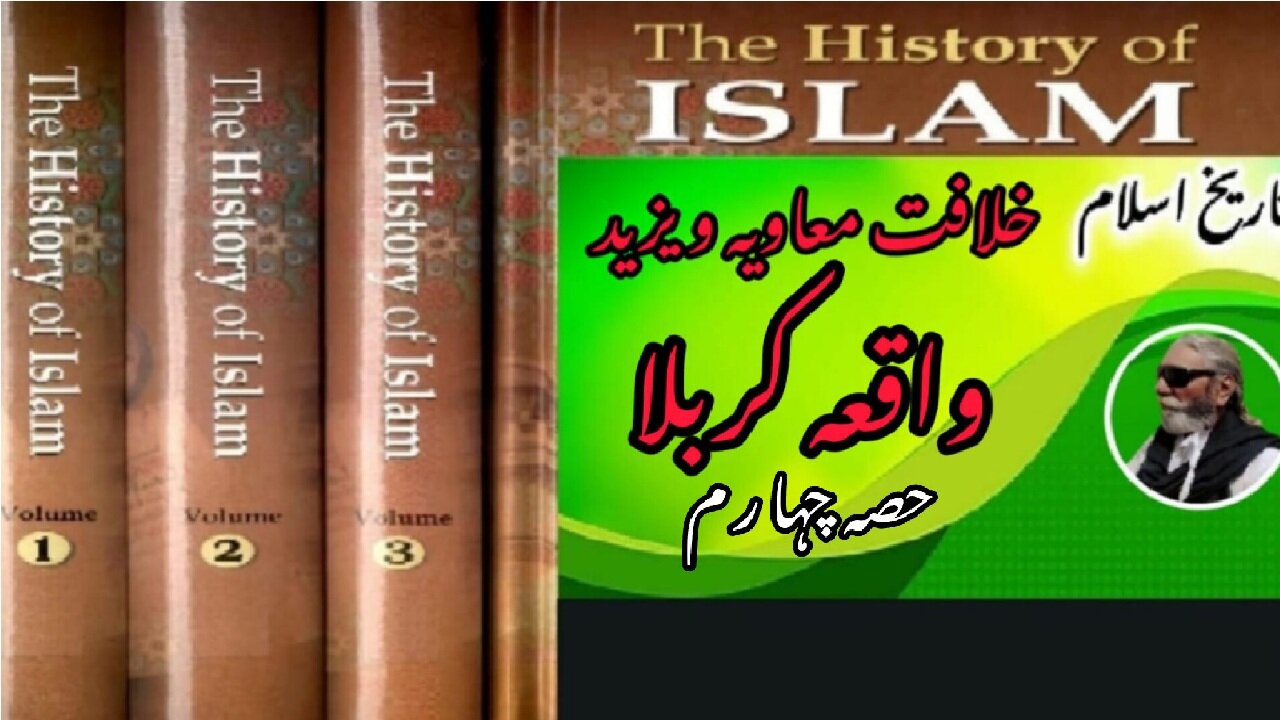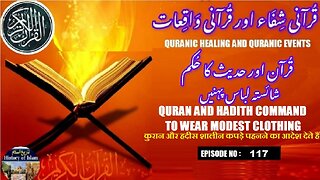Premium Only Content

Karbala Incident Part-IV | Yazid's Reign And The Martyrdom Of Al-Husayn Ibn 'Ali
@islamichistory813 #yazidsregn #martyrdomofimamhussain #storyofkarbala #partIV
Asslamoalaikum sisters brothers friends and elders, today we are discribing that Yazid's Reign And The Martyrdom Of Al-Husayn Ibn 'Ali (Part-4)
He continued,
Forsooth the sons of Hashim played with power, for neither a word came [from God] nor was a revelation sent. I would not therefore be a true descendant of Khindaf [his ancestral tribe] if I would not take revenge on the house of Ahmad [Muhammad] for all he had done.19
Yazid's desire for drinking wine, singing girls, playing lute, and hunting, playing with his tame monkey, licentiousness and incestuous marriage (yashrabu al-khamr wa yankihu al-huram) showed him as a frivolous libertine.20
In the first year of his short reign of a little over three years, he martyred al-Husayn Ibn 'Ali. In the second year, he had his army pillage Medina. He summoned Muslim Ibn 'Uqba al-Murri, an old soldier who was deeply devoted to Umayyad. Since he was of great age and his infirmities had grown worse during the preparations for expeditionary force, Muslim set off in a litter. The army had been very well equipped, in anticipation of a difficult and detested campaign. Each soldier received a bonus of 100 dinars, in addition to his ordinary full pay. Reaching the oasis of Medina, Muslim went to pitch his camp on the Harra.
The Medinans had had time to dig and fortify a trench, on the vulnerable side of the town and it was there that a savage battle took place. At first, the battle went in the favor of the Medinan rebels, but it ended in the defeat of them, when Marwan obtained permission from the Banu Haritha to pass through their quarter with a detachment of cavalry and took the defenders the trench from the rear. The Medinans fled like ostriches. The Qurayshis were the first to take the flight and seek refuge in Mecca. Ibn Hanzala resisted bravely and fell with his eight sons (or most of them) and a number of men as resolute as himself.
The Syrians abandoned themselves to an appalling pillage that continued for three days. The soldiers took the opportunity to riot. The number of the victims differs from 4'000 to 10'000. They made the sacred district of the Prophet permissible for three days. They plundered the houses, killed the men and raped the women.
Many virgin girls were pregnant and gave birth to children with unknown fathers. Muslim compelled the defeated to renew their oath of loyalty to Yazid and demanded that they should recognize themselves to be the slaves of the caliph, who was thus free to sell them and their possession alike. Some individuals who refused to submit to this demand or who stipulated as a condition for their bay'a, that Yazid should undertake to follow the Holy Qur'an and the Sunna of the Prophet were executed.21 Muslim Ibn 'Uqba was then given the nickname Musrif Ibn 'Uqba (prodigal of human blood) because of the massacre of al-Harra.
In the third year of Yazid's reign, after a short stay in Medina, Musrif Ibn 'Uqba continued his way to Mecca where he had to fight 'Abd Allah Ibn al-Zubayr. Ka'ba was set on fire in the war against Ibn al-Zubayr. The town was bombarded with catapults (manjaniqs). They fought in the secure sanctuary of Mecca.22 Fighting continued until Yazid's death. He died in Hawwarin in 64/684. Ibn 'Arrada a minor Khurarsanian poet described the end of the kingdom of Umayyad as,
The body of Yazid laying in his pleasure palace at Hawwarin,
with a cup next to his pillow and a wine skin whose nose was still bleeding.23
Our Sunnite brother believes that, having elected [Abu Bakr in the Saqifa], the Muslim got rid of a hereditary government based on ancestry and blood. If one Hashimite, who was of course worthy for this task, had been elected at the first stage, both the worldly government, and religious and spiritual leadership would have been stabilized and limited to Banu Hashim. It would have led to a theocracy and priesthood ecclesiasticism, which now exists among the Christians.
Moreover, the same deviation that arose among the Christian, Magus and Buddhist priests would occur in the Muslim community, and the followers of this faith. The leadership of the community, the right to vote, and economical interest would be excluded to one family. During ages, a special group of people would be privileged to all other men. Abu Bakr's election was neither a precipitate and ill-considered deal, nor a predetermined plan, which came true. It was a divine arrangement that God the Powerful, His decree and His will wanted to make Islam prevail over all religions and to keep the unity of word.24
We believe that if 'Ali, a Hashimite, who was of course worthy for this task, had been elected at the first stage, the blessed tree (Ahl Al-Bayt) 25 would govern Islam, and the cursed tree (U mayyad) 26 would not grow. God explicitly and implicitly had introduced the Prophet's successor and the elevated position of the Apostle of God's family above the rest of the faithful. Certainly, if 'Ali, the Hashimite, had been elected, the Prophet would not witness people rush towards the house of Fatima, who was still bereaved of her father's death.
He would not view the martyrdom of his grandson al-Husayn and his naked body under the sky soiled with his blood and dismembered, his body trampled on with horses, broken and bruised back. He would not observe his daughters and his grandson 'Ali Ibn al-Husayn be captives and fastened with chains around their necks; his male descendants lie dead blown about by the wind and the severed head of al-Husayn be poked at the teeth with a cane. He would not see the Umayyad and the 'Abbasid be his successor and his progeny, the citadels of the pious and the repositories of knowledge, be removed from their office.
He would not examine the sacred district of Medina be permissible for three days. The houses in Medina be plundered. the men would be killed and the women be raped; many virgin girls be pregnant and give birth to children with unknown fathers and Muslims recognize themselves as the slaves of the caliph, who was thus free to sell them and their possession alike; Ka'ba be set on fire and the town be bombarded with catapults (manjaniqs).
We saw that a few years after the Prophet's death, the Umayyad collapsed the caliphate. The caliphate itself was transformed. No longer was the principle of early merit (sabiqa) and service in the cause of Islam, acknowledged. Instead, swords and soldiers, boots, the natural prop of despotism, determined thenceforth the identity of the vicegerent of God on earth! The caliph became counterpart of, and successor to the Roman-Byzantine emperor. He ruled Muslims as his subjects, absolute lord over their life and death.
Mu'awiya carried on successfully bribing, cheating, extorting, threatening, and murdering his way through his reign in order to consolidate his grip on money and power and to secure the succession of his unattractive son Yazid. Lacking Islamic legitimacy, his reign required the claim of revenge for the wronged caliph as a permanent legitimizing seal. This was the product of the Saqifa. The cursed tree succeeded the blessed tree.
'Umar Ibn al- Khattab says, “By God, the oath of the allegiance for Abu Bakr was merely a precipitate deal (falta) which then was carried out”.27 However, our brother says, “Abu Bakr's election was neither a precipitate and ill-considered deal, nor a predetermined plan, which came true”. We wonder which of them is right.
The unity of word and the privilege of Islam over all religions was an ideal that never came true. God says:
And obey Allah and His Apostle, and do not dispute, or you will lose heart and your power will be gone; and be patient, indeed Allah is with the patient. (Holy Qur’an, 8:46).
When the Prophet (S) passed away, 'Ali was faced with two problems: The problem of losing his legitimate right and the problem of vanishing Islam. He realized that Islam was more important than his right. Nevertheless, he did not split the unity of the Muslim community.
He renounced his claim rather than seeing harm to Islam. He found that endurance thereon was wiser. Therefore, he adopted patience “although there was mote in the eyes and suffocation in the throat”.28 However, his enemies ignored Allah and His Apostle's ordinance and a few years after the Prophet's departure, they initiated the first civil war in Islam.29
They revolted against the central caliphate and their then Imam and divided the community of Islam into two enemy groups. The gap between Muslim parties was deeper, the enmity between Muslims became severer during the Umayyad reign, and beyond, which has continued up to now. There is only one God, one Prophet, one Holy Qur'an and one Qibla, but there are some Islamic sects, which excommunicate other Muslims and kill each other.
The Muslim caliphs and emperors conquered many countries, but the Islamic virtues could not prevail over all territories. The Mongol emperors occupied more lands than that of the Muslims, but we do not appreciate them for their conquests. The ideal of Islam was to preach moral characteristics and prominent virtues. Many Muslim countries are now subjected to Christian or Jew governors. The Zionists govern Palestine and the Farther Mosque (masjid al-aqsa). The Americans occupied Afghanistan and Iraq. They imprison and kill Muslims, exploit their natural sources and rule over their people.
Allah Hafiz
-
 7:16
7:16
ISLAMIC HISTORY
16 hours agoThe Quran and Hadith command to wear modest clothing قرآن و حدیث کا حکم، شائستہ لباس پہنیں
2 -
 13:09:34
13:09:34
LFA TV
1 day agoLFA TV ALL DAY STREAM - MONDAY 8/11/25
210K20 -
 1:44:36
1:44:36
RiftTV
6 hours agoBREAKING: Trump FEDERALIZES D.C. To RESTORE Law & Order | The Rift | Ryan Matta, Olivia Krolczyk + Braeden Sorbo
50.6K16 -
 3:00:47
3:00:47
megimu32
5 hours agoOTS: Breakfast Nostalgia + Blind Chocolate Cereal Showdown… LIVE! 🍫🥣
41K2 -
 3:36:47
3:36:47
LIVE WITH CHRIS'WORLD
12 hours agoLIVE WITH CHRIS’WORLD - It’s Called LAW & ORDER
34.3K4 -
 11:07
11:07
AlaskanBallistics
1 day ago $0.06 earnedBreek-Lok Quick Detach Hub Mount and Flash Hider System Review
28.5K5 -
 57:44
57:44
Donald Trump Jr.
9 hours agoExclusive Interview with Deputy Secretary of State Chris Landau | Triggered Ep266
115K55 -
 58:40
58:40
BonginoReport
12 hours agoModern Dating Woes & How To Resist Temptation w/ Tilly Dillehay - Hayley Caronia (Ep.109)
48.1K20 -
 53:55
53:55
The Quiet Part
12 hours agoThey Want You to Sign Over Your Life Insurance—So They Can Keep Lying to You
20.4K10 -
 1:47:05
1:47:05
The Mike Schwartz Show
8 hours agoTHE MIKE SCHWARTZ SHOW Evening Edition 08-11-2025
20.4K6